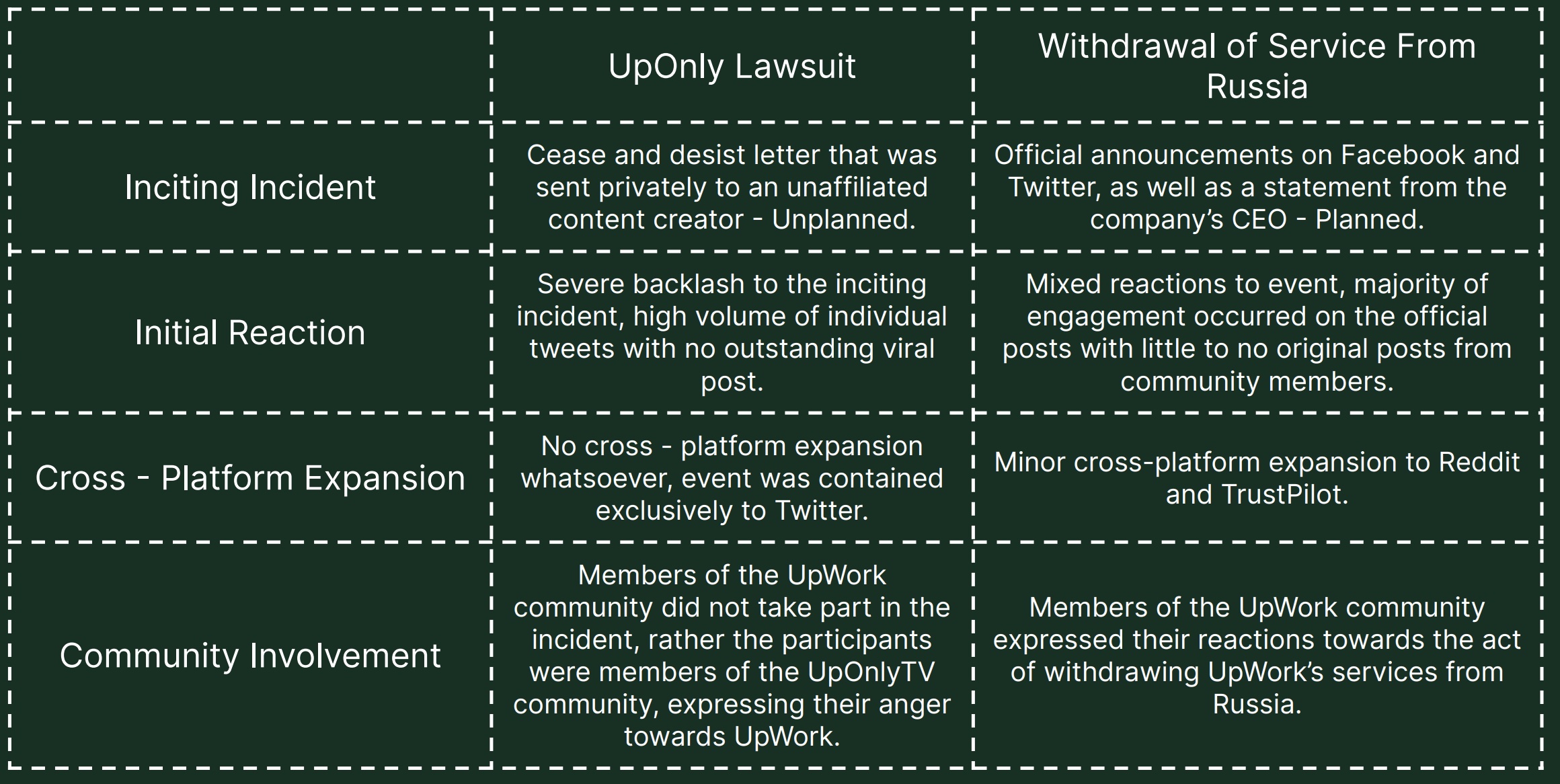The company had to deal with two major events recently. Affogata prepared a special customer feedback analysis related to these two incidents, revealing data that can direct Upwork to figure out how such incidents resonated with its customers. With close to 40,000 posts tracked and analyzed from all over the open web, such analysis presents an accurate picture of the aggregate voice of the company’s consumers.
Throughout the months of February and March, two major events drove neutral and negative engagement in mentions of UpWork. The first, on February 25th, involved podcaster Cobie announcing he received a cease and desist letter from UpWork, claiming copyright infringement had occurred with the design of UpOnlyTV’s hats since they sported the word ‘up’ and a color scheme of green and white.
The second event that drove neutral and negative engagement occurred on March 7th and 8th, following the announcement that UpWork would be suspending its services in Russia and Belarus, effective immediately.
The following graphs show the two customer mention peaks, resulting from the incidents.

Deep-dive #1: the UpOnlyTV lawsuit
On the 25th of February, Cobie, a cryptocurrency and finance content creator with a little more than 645K followers, posted a tweet containing a screenshot of a cease and desist letter he received from Upwork. The letter claimed that the design of his merchandise, specifically the word ‘up’ that was embroidered on a hat in a green and white color scheme, violated UpWork’s trademark and constituted copyright infringement.
This incident set off a series of tweets by this creator, highlighting the legal maneuvers and claiming that UpWork was unfairly targeting him, simply because the word ‘up’ was included in his merchandise.
Following the initial tweets, there were 2,956 mentions of the incident over a period of two days, accounting for 15.38% of all February mentions. The community’s main reaction was to repeatedly tweet the same phrase – ‘F(xxx) @Upwork, buy an Up Only hat. Pump it loomdart’. This was tweeted 1,160 times throughout the reporting period.
The first part of the tweet is an encouragement to buy the merchandise that started the conflict, and ‘Pump it loomdart’ is a phrase used by the Twitter crypto community as a call to action. Additionally, Cobie has made it a point to post mocking content, including a $25,000 offer to any member of the UpWork PR team willing to tweet this phrase.
Cobie’s offer ended up not being accepted. There has been no official reaction or statement from UpWork, or any reaction from members of the UpWork community.

Apart from the aforementioned tweet, where $25,000 was offered in exchange for an UpWork employee posting a defamatory tweet, this incident appears to have created a high volume of mentions. However, engagement on each mention is low, and it appears that no posts have become significantly viral.
Additionally, it appears this incident has been contained to Twitter only, with no mentions on other platforms relating to UpWork.
Deep-dive #2: The suspension of service in Russia
On March 7th UpWork announced the suspension of business in Russia and Belarus, in response to the war with Ukraine. Announced in posts on Facebook and Twitter, this development generated mixed reactions from the community. Some commenters praised the action and the additional steps that were taken to support freelancers in Ukraine. Others claimed that this was an unfair and ineffective decision, as the people affected by this were Russian freelancers and not the Russian government.

The main bulk of reactions to this event occurred between March 7th and 8th, with the majority of mentions being direct responses to the posts announcing the withdrawal of services from Russia. The relevant Facebook post had 835 comments, accounting for 4.34% of overall mentions throughout the month of March, and an additional 960 retweets and
replies to the official announcement on Twitter, accounting for an additional 4.99% of mentions.
Overall, replies to the original posts accounted for a combined 9.33% of mentions during the entire month. Overall, the reaction has been mixed but mostly negative with 47% of comments on the announcement posts being negative, largely criticizing this decision and its implications on small businesses. This was compared to 9% of positive comments, mostly praising the public stance to stand with Ukraine.

Conclusions
Backlash, damage control and brand reputation
The first conclusion deals with the intensity of the reaction to the UpOnlyTV lawsuit and tells of the type of community that experienced the event. It seems that the topic of cryptocurrency attracts passionate and loyal individuals, as can be seen in the way the entire community rallied to protect one of their own.
Additionally, the narrative of the incident became a sort of David and Goliath – a large company with major legal resources and litigation power facing off against a small, independent
content creator. This narrative drove the community to action even further and shows the level of protectiveness that members of the crypto community feel towards each other.
In the age of social media, specific communities have an easier time banding together against a shared adversary; therefore, the interaction between the two sides should be carefully examined, with special consideration devoted to the potential negativity surrounding a brand’s online presence. Damage control measures, as well as brand reputation actions, must be considered in these types of situations.
Evaluating both incidents separately
The second and final conclusion relates to the interesting distinction between the two incidents examined in this report, referring to the community that reacted to each event.
In the case of the UpOnlyTV lawsuit, members of the crypto community were the ones who reacted and drove engagement, meaning that an outside community shone a negative light on UpWork. Conversely, the reactions to the withdrawal of services from Russia came from within the community itself, with active users of the platform expressing their dissatisfaction with the direction in which UpWork was going.
It is debatable whether one is more consequential than the other. On one hand, the lawsuit caused an outside community to shine a negative light on UpWork while the organic community was silent, which is more likely to affect user acquisition. However, negative feedback from within the community is more likely to cause users to churn from the service.
Affogata for UpWork
Affogata analyzes user feedback from the open web and combines it with internal feedback data sources becoming the single source of truth for user feedback.
If UpWork would have been using Affogata, our platform would have triggered an alert as soon as negative sentiment would have started to rise in those volumes on both the UpOnlyTV lawsuit and the withdrawal of their services from Russia and Belarus. Our platform would have “bought” the UpWork team some extra time to assess and act on the situations.
Besides the reactive use case, using Affogata, UpWork would have been able to do market research on other brands withdrawing from territories due to the war. The research would have shown how other brand’s employees and customers are reacting to the withdrawal, allowing UpWork to learn from them before creating their withdrawal messaging and announcement plan.
Ultimately, using Affogata’s impact score, UpWork would have been able to understand the impact of both incidents on its brand reputation. They say it’s difficult to put a price on brand, but it’s a lot easier to understand its value when it can be quantified by Affogata’s impact score.
